The best quality of traffic comes from Google by ranking for keywords. The more keywords you rank for, the more traffic you get from Google. But how would you find these keywords? Find a nice tool from this list of the best keyword research tools for bloggers to choose from.
Keyword research is the basis of SEO. No matter how optimized your site is for SEO, if you’re not ranking for the right keywords, then your SEO efforts are wasted.
That’s why SEO starts with keyword research. So, if you want to find some juicy keywords to rank, then this post is for you. You will learn
- The best keyword research tools for SEO and
- How to use them to find the right keywords
Want to save this pin for later?

This post may contain some affiliate links that is I may earn a small commission at no extra cost to you that I would use to maintain this blog. Thanks for understanding.
What is a Keyword Research Tool?
Keyword research is the process of finding certain terms or phrases that your target audience is typing on the Google search bar when searching for their questions online.
If you know these exact phrases and use them in your content, then your chances of showing up on search results increase. People click on your link, and you get a blog visitor.
For example, you want to search for the best coffee shops near you. You will type on the search bar “best coffee shops near me.” Google shows the websites that have used this keyword in their content.
Tools used for keyword research help in finding these keywords. These tools rank keywords based on various parameters such that you can choose those that help you get the first spot.
Why Use Keyword Research Tools?
Ranking first on the SERPs is the ultimate goal; however, there are many instant benefits of using keyword research tools that help you keep going.
- Content Ideas – By using keyword research tools, you get new ideas to create more content. These ideas help to create an overall content strategy.
- Understand your audience – The more you understand the target audience, the better engaged they are. Using keyword research tools, you find questions that your target audience has, then you create helpful content using the exact phrases they used. This builds trust.
- Plan topic clusters – Most keyword research tools have a “Related” keyword section; use these keywords to create topic clusters. This helps in building authority in a niche.
- Create subsections and FAQs – Keyword research tools give plenty of questions that you can use to create a blog post’s outline by adding more subsections and FAQs.
Now that you know the benefits of using keywords, here’s the best keyword research tool list you’ve been waiting for.
4 Best Premium Keyword Research Tools For Bloggers
Paid keyword research tools are better than free tools because they unlock many features (metrics). And keyword research is all about metrics, so if you can, then invest in a premium tool you should.
Here are the top 4 premium keyword tools that I think are great for bloggers.
SEMrush
SEMrush is one of the most accurate keyword research tools in SEO for anyone who wants to rank on the first page. It’s not just a keyword finder tool but the ultimate SEO tool that helps in doing many things like
- Backlink analysis with auditing and prospecting.
- Content analyzer with performance tracking.
- Social media poster and tracker.
SEMrush has two types of tools for finding keywords.
Keyword Magic Tool
The keyword magic tool helps you find new keywords that you can potentially rank for. Use filters to your search and choose keywords based on search volume, keyword difficulty, and more.

For example, you can see the keyword “what is SEO” is extremely competitive (check KD%), and so not a good keyword for new websites.
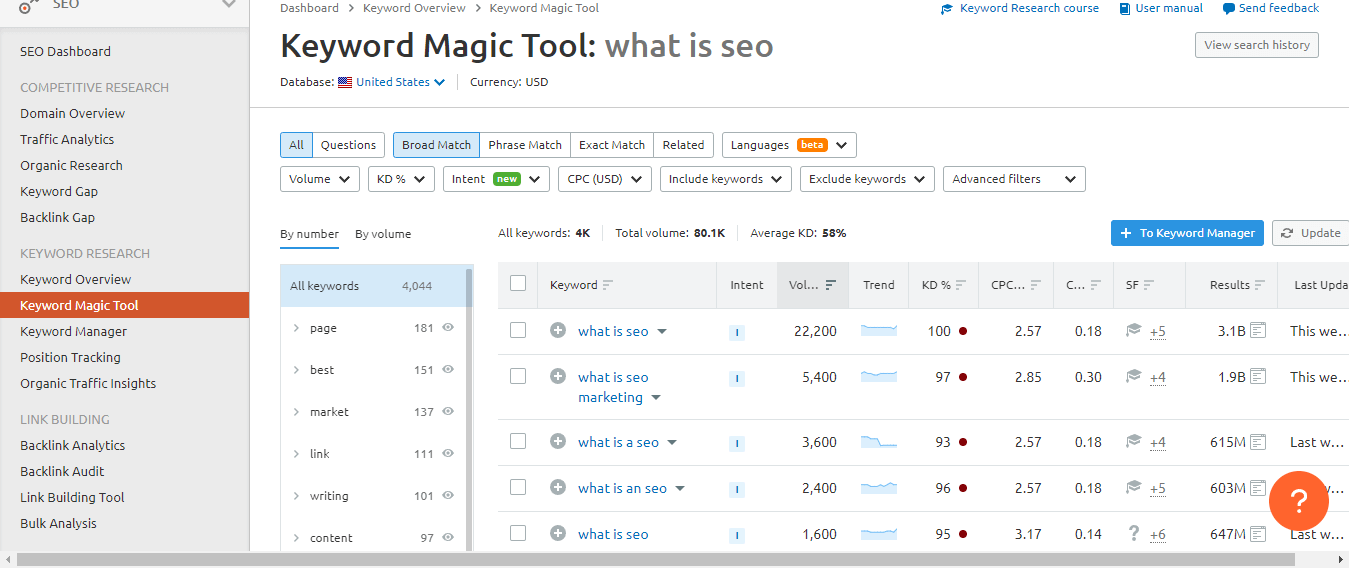
Another great thing is the “intent” filter. By choosing keywords based on the searcher’s intent you can create specific content for all steps in a funnel.
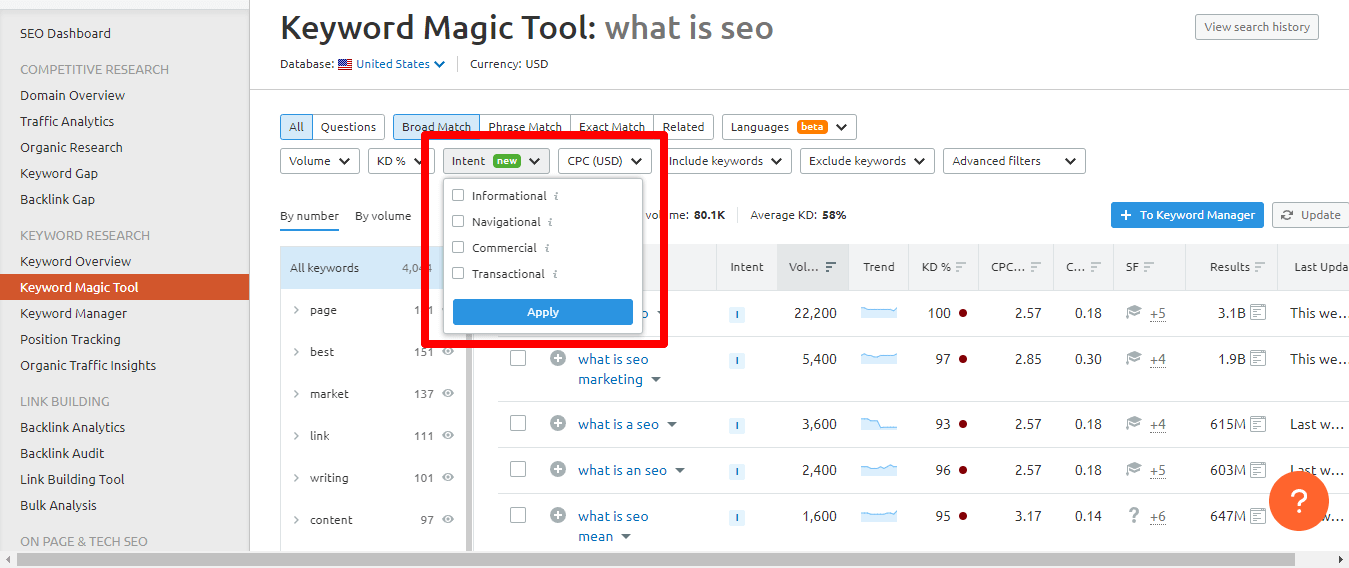
Keyword Gap Tool
The keyword gap tool finds keywords that your competitors are ranking, but you’re not.
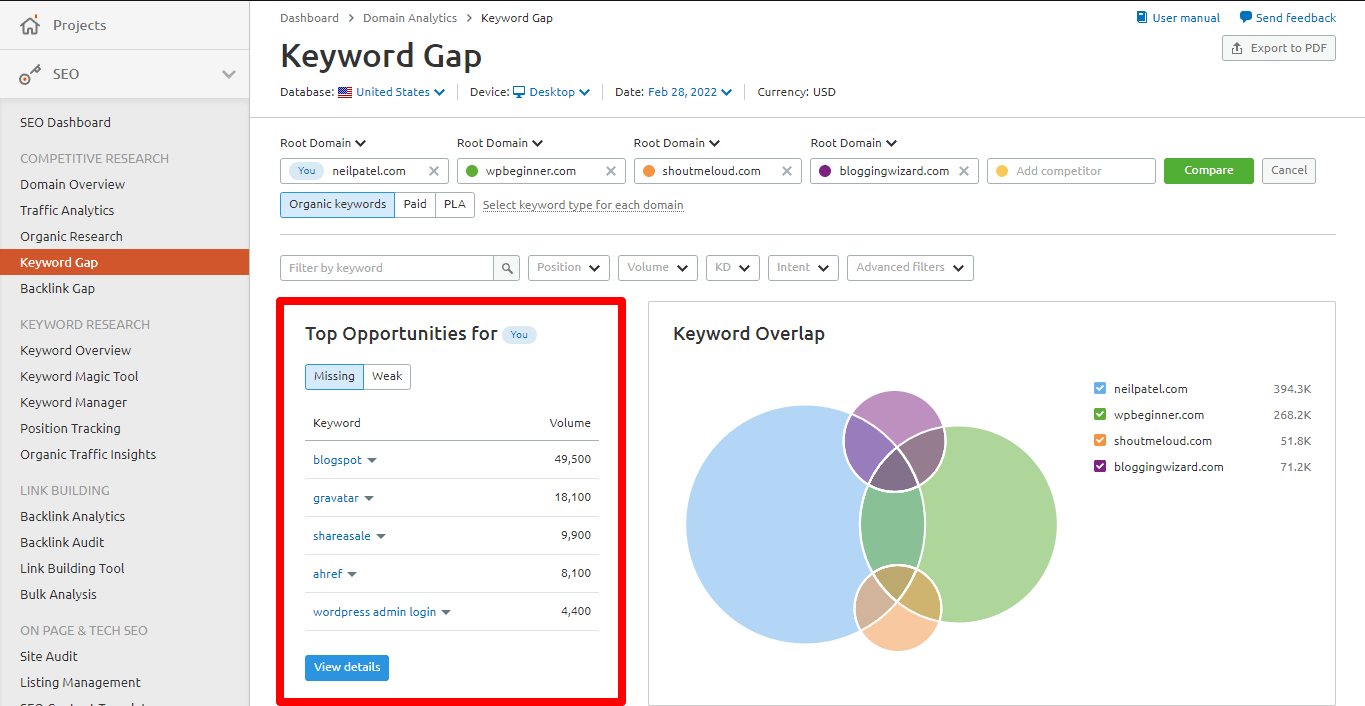
Ahrefs
Just like SEMrush, Ahrefs has great keyword research tools. The free keyword-finding tool generates lots of keyword ideas along with their keyword difficulty.
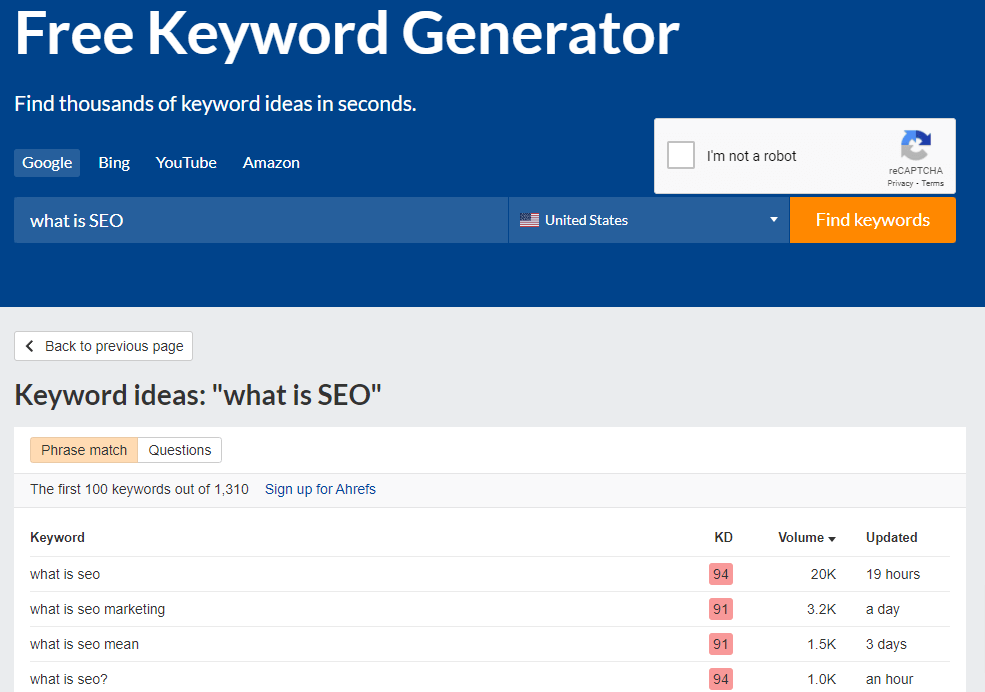
Then, the Ahrefs Keyword Explorer finds keywords using filters like keyword difficulty, search volume, and more.
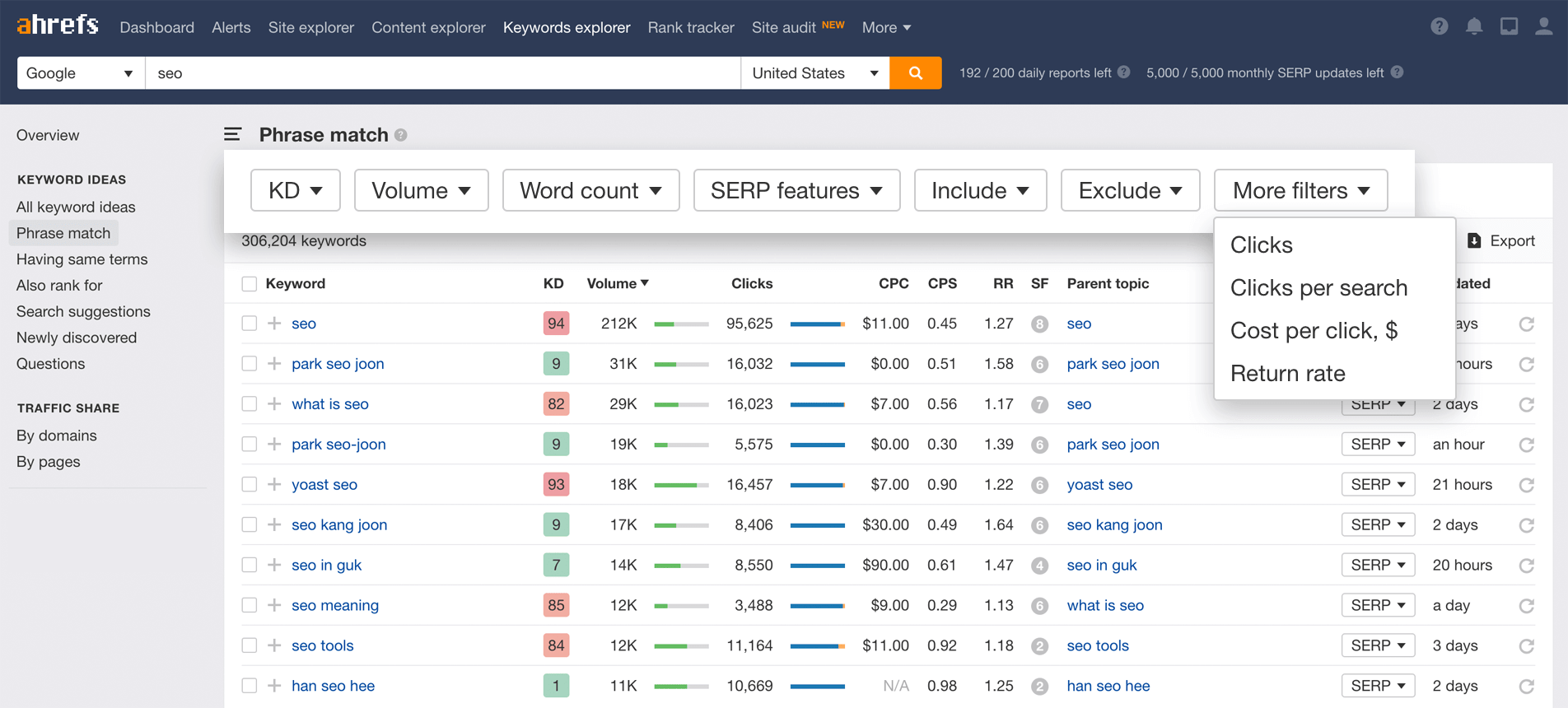
I love checking out the “Organic Keywords” section because it shows the keywords my site ranks for. Such as keywords ranking on the 2nd or 3rd page, and then I refresh the content and get them to rank higher.
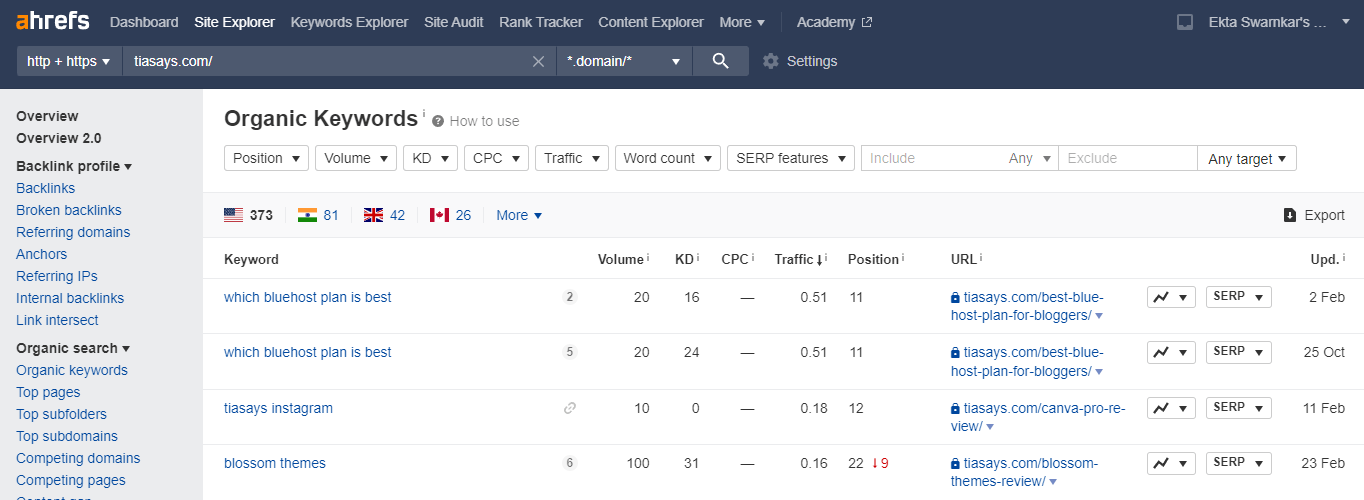
Check out the Ahrefs keyword research tool here.
Keyword Revealer
Keyword Revealer helps me analyze the difficulty of a keyword. I don’t use it to find keyword suggestions, as it rarely gives many, but I like to get a number between 0 to 100 to find out if the keyword is worth going for or not.
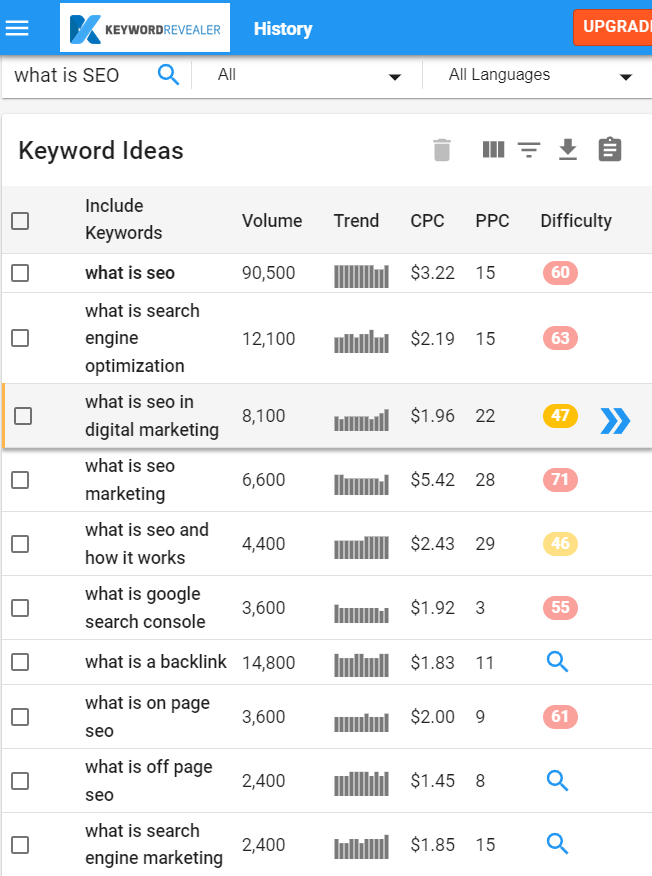
It shows a detailed report for each keyword. For example, check out “What is SEO in digital marketing.”
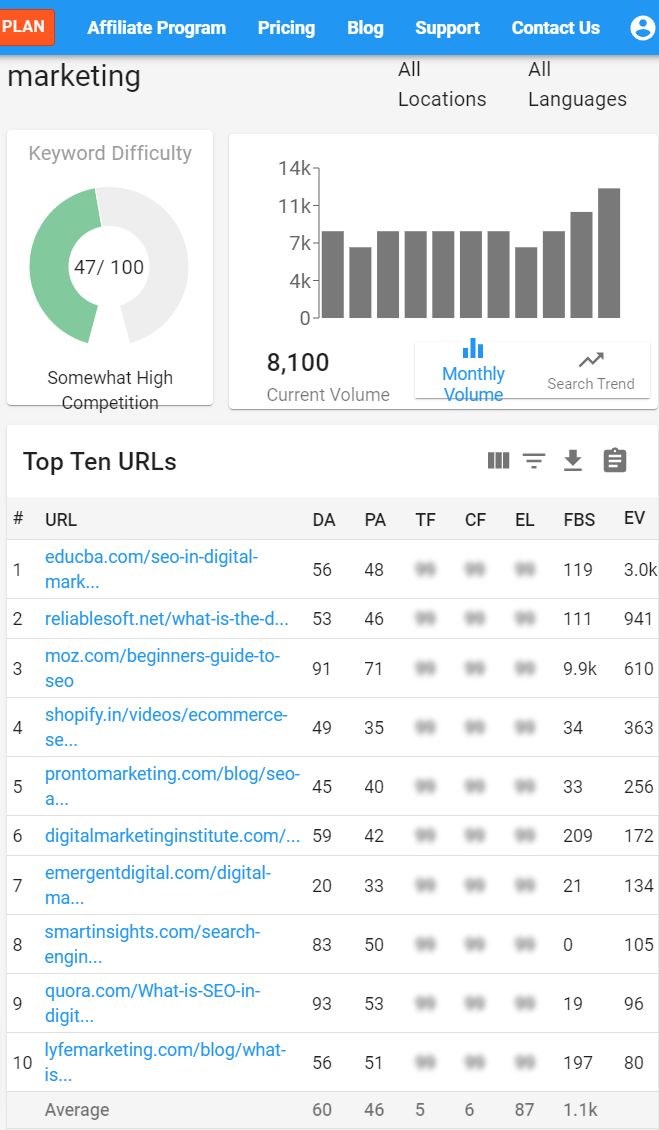
It also gives an average of backlinks needed, word count, domain authority, and more. You don’t have to find these details, which is a tiring process manually.
Check out the Keyword Revealer here!
LongTail Pro
Long Tail Pro is the best tool for newcomers. It finds less competitive long-tail keywords to help you get better search engine rankings quickly. Long-tail, less competitive keywords are exactly the type you must find.
Plus, it has many SEO tools to help you improve your organic presence.
Check out the LongTail Pro here!
So these are the premium keyword research tools that I recommend. However, I do not want you to limit your choices to premium tools only. Below are my favorite free keyword research tools that I use regularly.
7 Best Free Keyword Research Tools For Bloggers
If you’re new to keyword research and want to test the waters first, then I recommend you start with free keyword tools.
And don’t hesitate because these are free; you’ll gain great insights and experience using them. Once you understand what you’re doing, move to a premium tool.
Ubersuggest
I love Ubersuggest because it’s a part of my regular research. I get 3 free searches per day. It’s similar to SEMrush and Ahrefs.
Ubersuggest helps you do many things such as
- Site Audit – to audit your site to find and fix errors.
- Keywords – to find new keywords and generate content ideas.
- Traffic – to see which pages (or keywords) on a site get traffic.
- Backlinks – to find link-building opportunities.
Here’s how to find keywords on Ubersuggest. Type “what is SEO,” and this screen comes up.
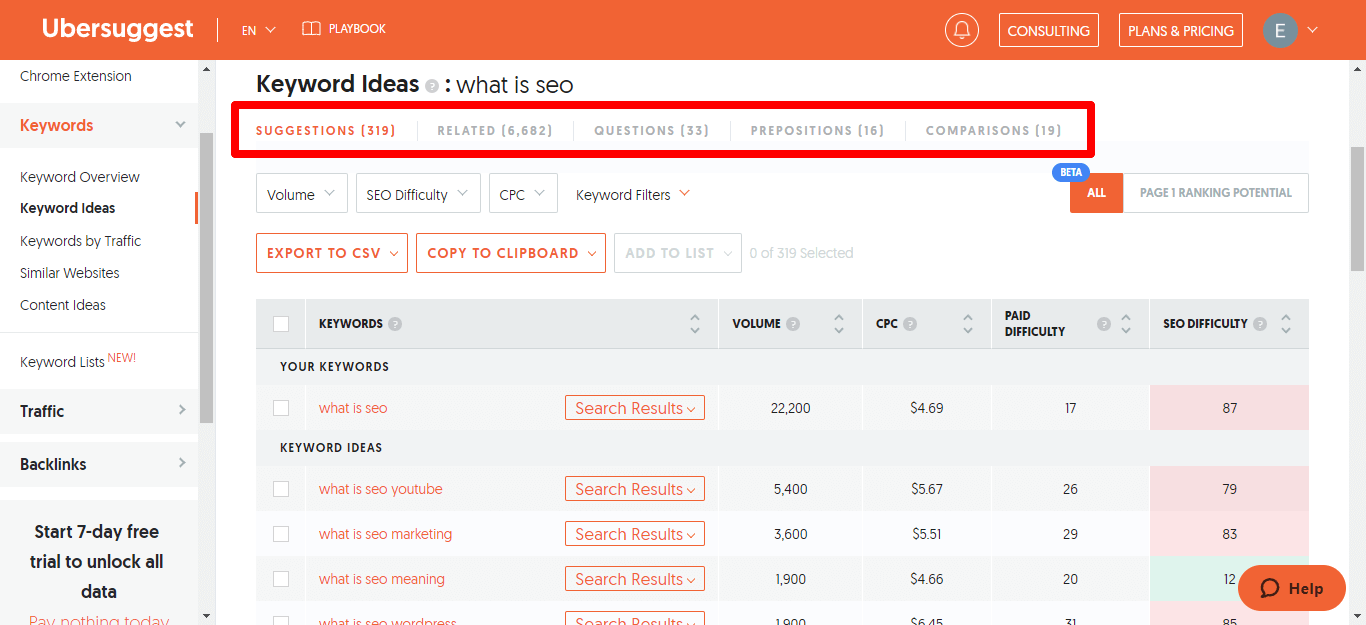
Choose keywords from categories like Related, Questions, Prepositions, and Comparisons. Use filters to remove difficult keywords.

The “Page 1 Ranking Potential” feature filters the best keywords automatically for your domain.
Ubersuggest is free to use.
Moz Keyword Tool
Moz created the Domain Authority factor and made it easier to analyze websites. After signing up with a Google account, you get access to the free SEO tools, including Keyword Explorer.
You get 10 free searches per month. It helps in finding keywords’ ranking difficulty.

Plus, it gives keyword suggestions to use as LSI keywords to avoid keyword stuffing.
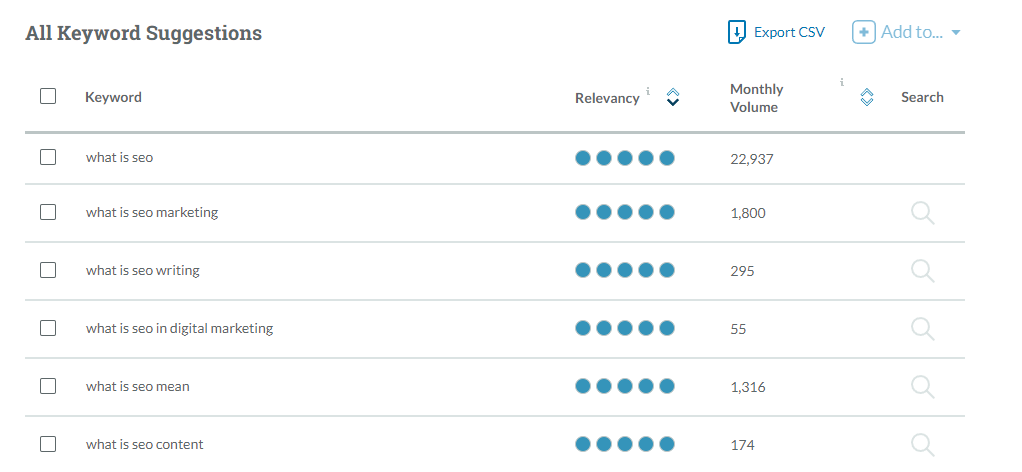
And you can set filters to extract keywords.

Answer The Public
Answer The Public is a great free tool for content creators to discover new ideas. It doesn’t show keywords based on their keyword difficulty or search volume. But it shows a mind map structure of all the popular keywords around a topic.
For example, here’s a mind map for the keyword “what is SEO.”
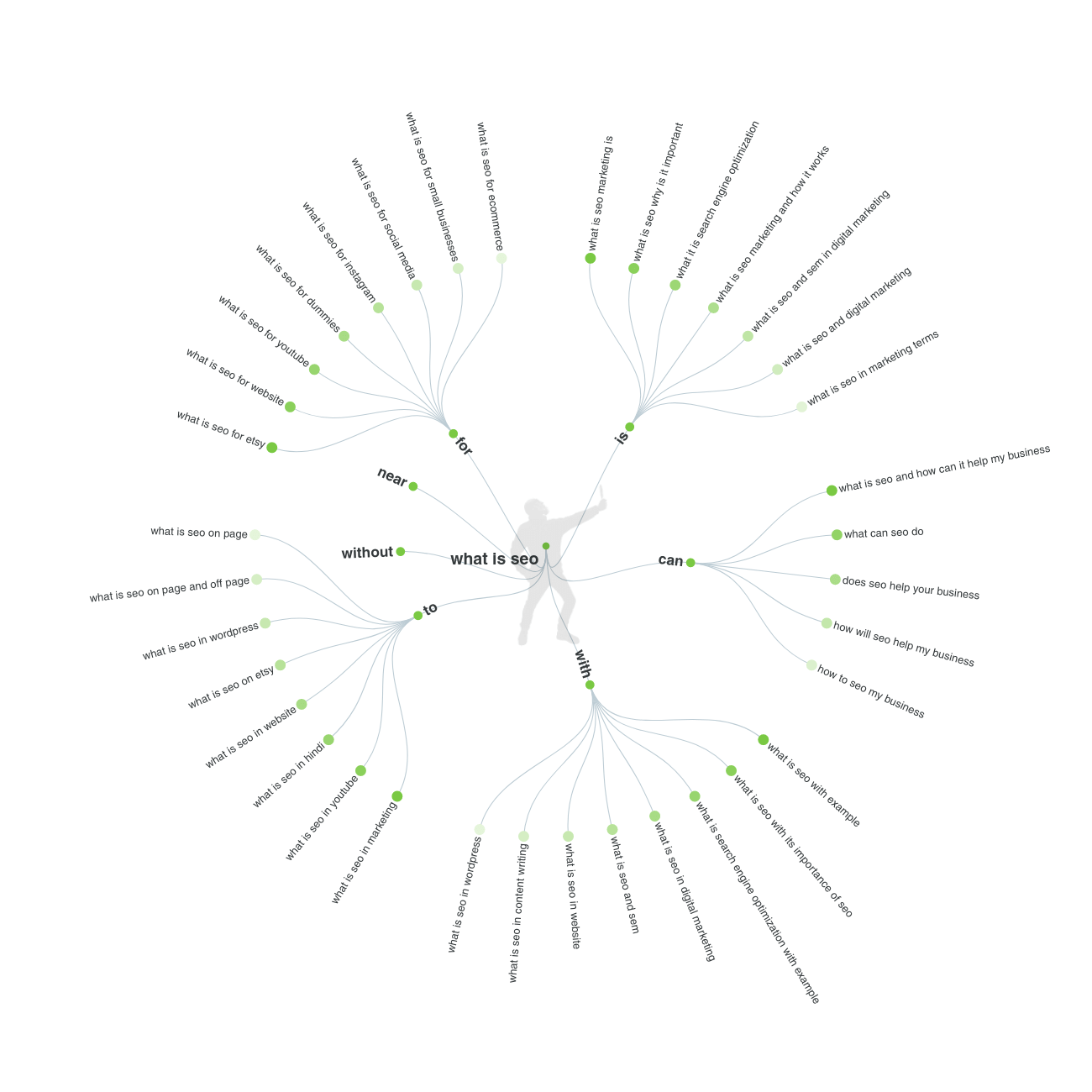
Scrolling down, you will see more suggestions for content ideas.
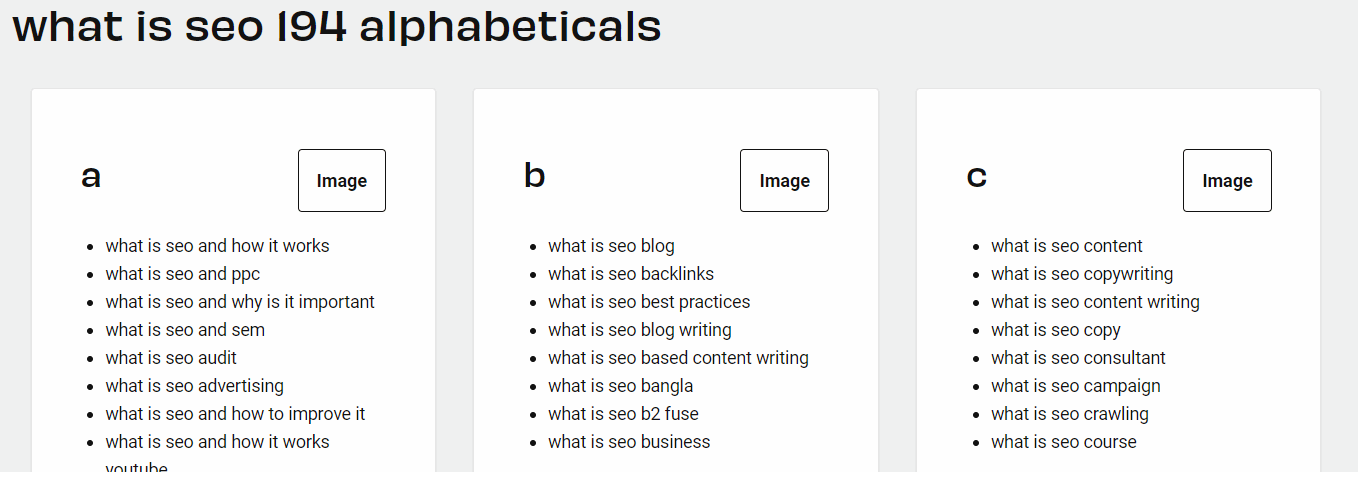
Google Ads Planner
Google Ads planner is a keyword research tool by Google for those who use paid ads. It’s one of the most loved, as it was the first one out there. However, if you don’t want to spend money on a premium tool, then you can use it. All you need is a Google Ads account.

Google Search Console
Google Search Console finds keywords that your site is already ranking but includes the unoptimized ones. This means you currently rank on the 3rd or 4th page for these keywords. Figure out which keywords are these and optimize your content, so you jump to the first page rankings.
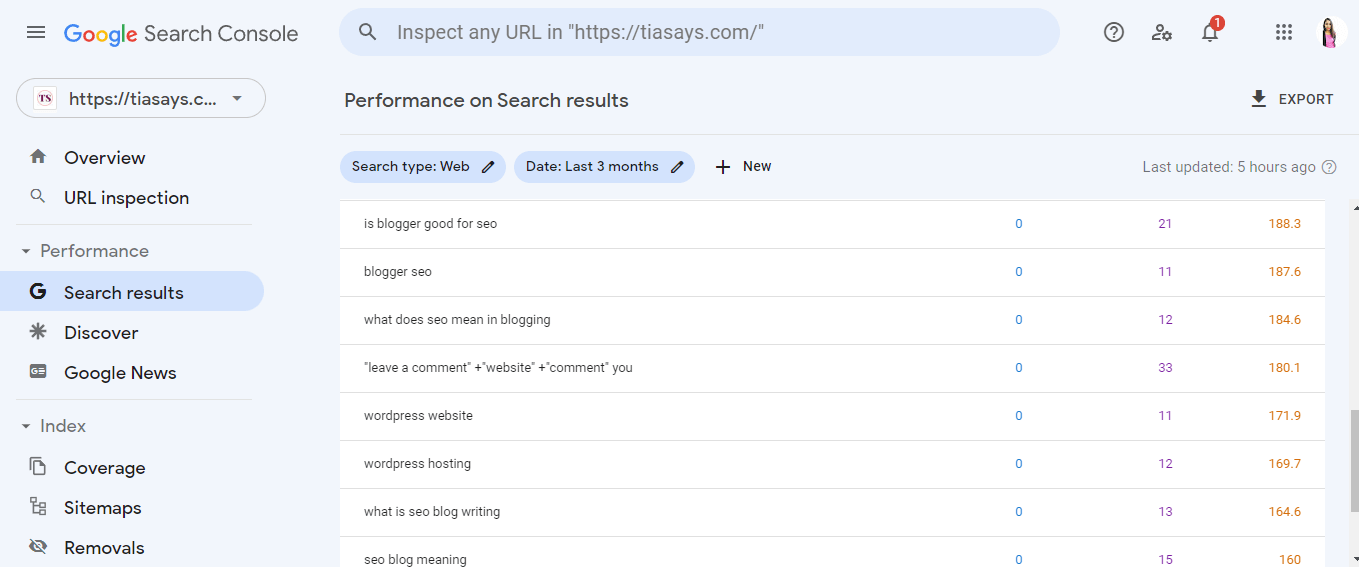
Google SERPs
Google SERPs is where keyword research starts from. When you enter a key term on the Google search bar, Google itself shows some suggested keywords. These keywords are very helpful as they directly relate to the main keyword. Using these different keywords (instead of keyword stuffing) makes it reader-friendly. Google shows related keywords in three places.
1- As the drill-down of suggested keywords below the search bar.
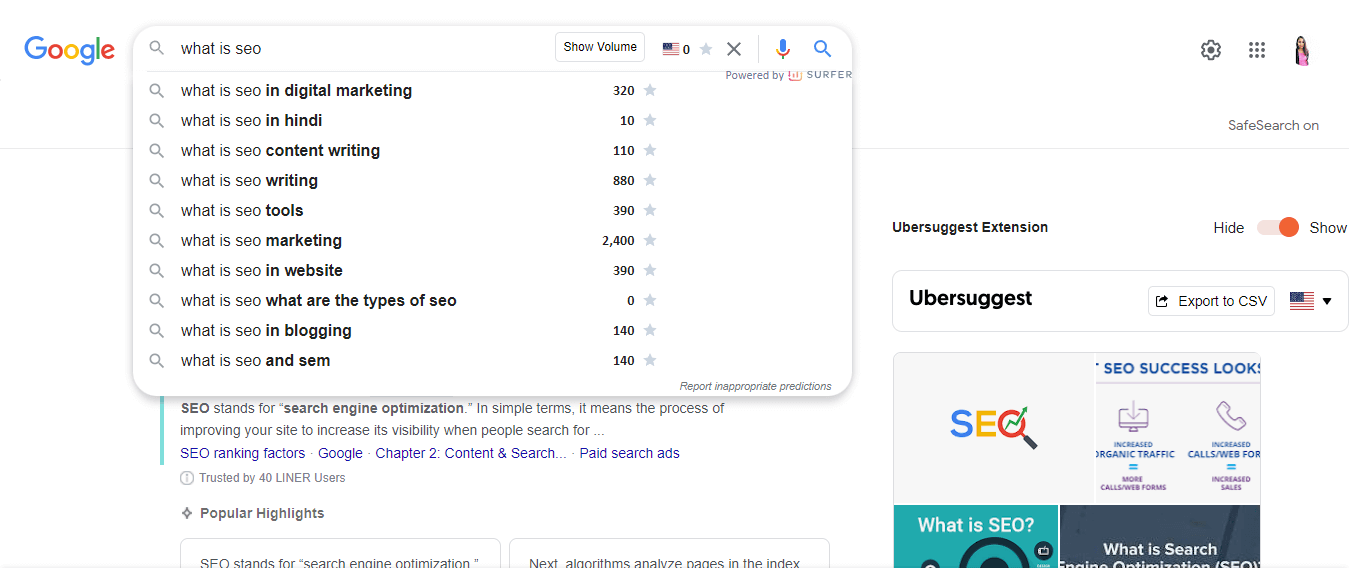
2- On the “People Also Ask” section.
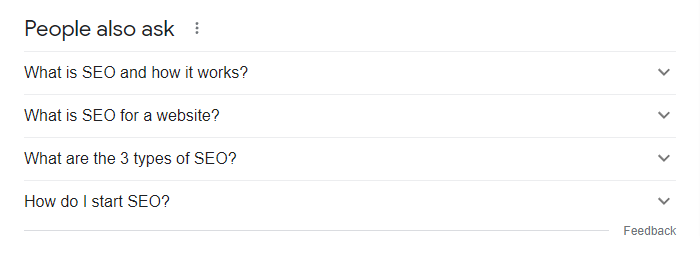
3- In the “Related Keywords” section.
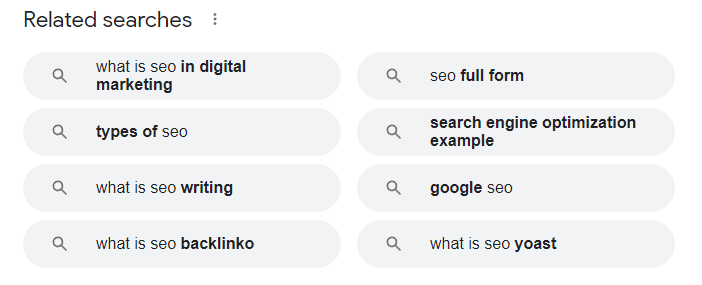
Google Trends
Then we have another tool, Google Trends. It is a great tool to figure out what’s trending. And the data comes directly from Google, so you can’t doubt it. Here’s the popularity graph of the term “what is SEO” for the last 12 months.
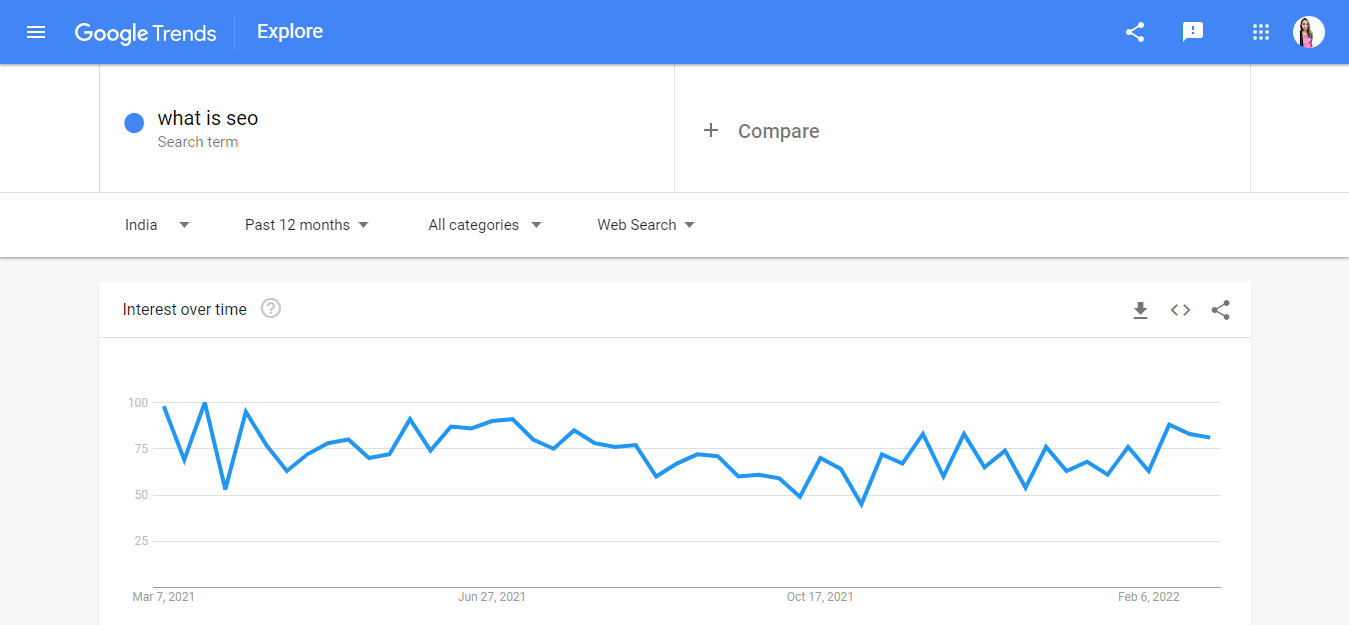
Or you can compare two terms such as this.
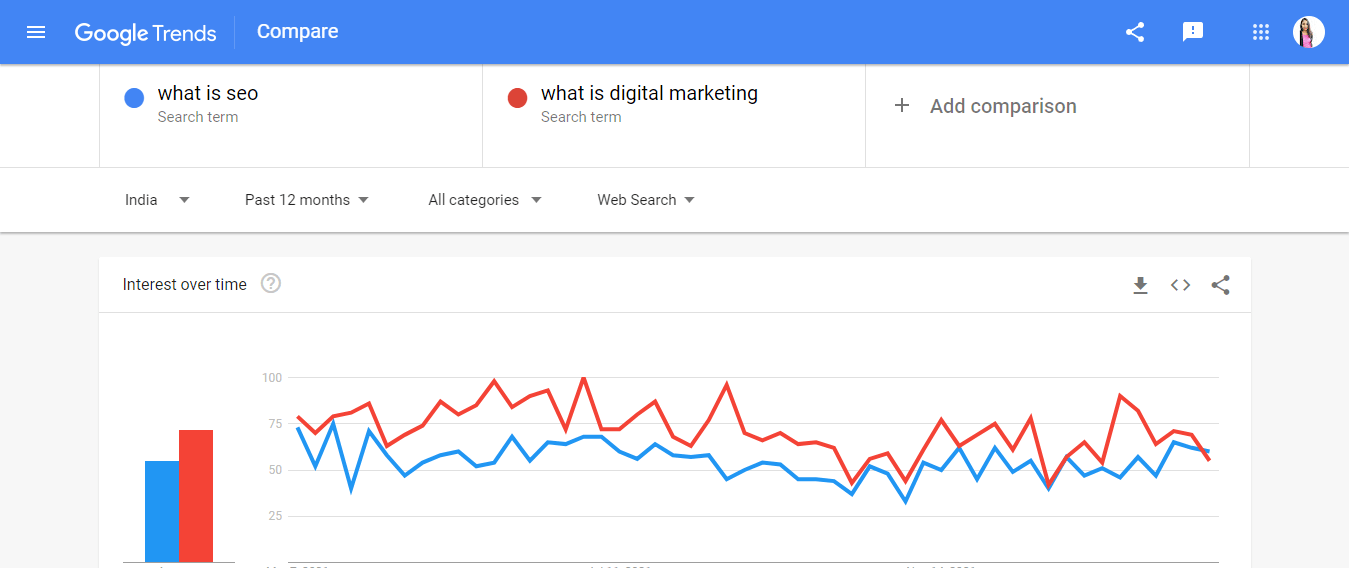
The comparison tool shows which keyword is popular. As you can see, digital marketing is more searched than SEO; therefore, it is a better keyword.
So these were the top keyword research tools for bloggers to use to publish optimized blog posts and improve SEO.
Which is the Best Keyword Research Tool for SEO?
Of all the tools I’ve used so far, I love the SEMrush tool. I trust it for finding keyword difficulty. However, I don’t use SEMrush only. Instead, I use many tools.
The reason is that these tools have unique features. For instance, SEMrush or Keyword Revealer helps in confirming the research.
How to Use Keyword Research Tools to Find Keywords?
Different tools help in different research. When I need more ideas, I use Answer The Public. For creating a strong outline, I use SERPs. It depends on what keywords you want.
What Type of Keywords to Choose?
You will need keywords mostly for writing blog posts. And as a new website owner, don’t target highly competitive keywords only to realize that you can’t rank for them and your efforts are wasted. So, you need to find the specific types of keywords.
- Long-tail keywords – Find long-tail keywords that have 3 to 4 words in them. (Established brands don’t target long-tail keywords as these have low search volume.) So, long-tail keywords are left for you.
- Less competitive – Since big brands focus on short keywords (1 to 2 words long) the long-tail keywords are less competitive and rank easily. Many tools have the “Keyword Difficulty” section; use it to find easy targets.
- Good search volume – Find keywords that have some search volume. Most long-tail keywords have zero search volume, but you should rank for those that bring you some traffic.
How to Find Long-Tail Keywords?
When I started, I used free tools, but now I use a combination of both. I use free tools to find potential keywords and premium tools like SEMrush or Keyword Revealer to confirm my research. But I follow a process for keyword research.
Conclusion: The Best Keyword Research Tool
So, these were some of the best keyword research tools for bloggers for SEO optimization. By now, you must have decided which tool you want to use.
You can also use combinations. Check out this guide to learn how to find low-competition keywords.
The key is to keep ranking for long-tail keywords such that you rank for many terms and your blog authority improves, then, you can focus on slightly difficult keywords.
Download this 35+ point SEO checklist to find all the places where you must use your keywords.
So, which keyword tool are you going to use? Have you tried any of them before? Have I missed your favorite tool?
More resources to check out:
- How to brainstorm blog post ideas?
- The ultimate guide on writing SEO friendly blog posts
- Best free SEO courses for bloggers
- Best writing & blogging tools for bloggers
I hope you found this post helpful. Follow me on Twitter, Facebook, and LinkedIn. Or why not subscribe to my newsletter and get blogging and writing tips straight to your inbox weekly?






Very helpful thanks!
Really good review!